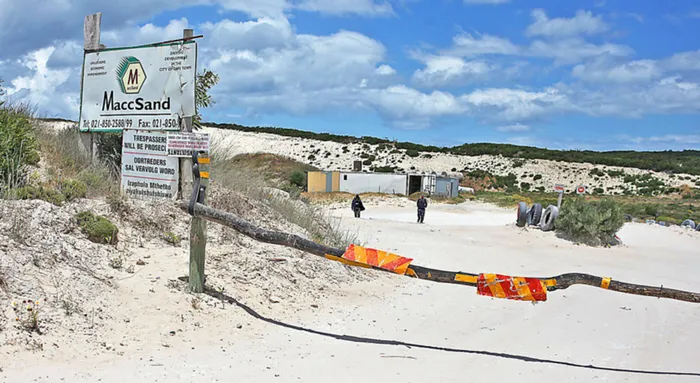
Cape Town - 131115 - Three sand mines in the Macassar area have come under scrutiny after one made claims that it was being targeted by the City of Cape Town. Due to a rezoning clause Macsand has been clsoed until it has sucessfully completed the apllication. Pictured: The closed entrance of the Macsand facility. REPORTER: JOHN YELD. PICTURE: WILLEM LAW. Cape Town - 131115 - Three sand mines in the Macassar area have come under scrutiny after one made claims that it was being targeted by the City of Cape Town. Due to a rezoning clause Macsand has been clsoed until it has sucessfully completed the apllication. Pictured: The closed entrance of the Macsand facility. REPORTER: JOHN YELD. PICTURE: WILLEM LAW.
Cape Town - Cape Town Mayor Patricia de Lille is ordering a forensic investigation of city officials who have allegedly been colluding with illegal sandmining operators at Macassar and elsewhere on the Cape Flats.
The officials will be called to explain why they have allegedly been targeting one sand mining company – Maccsand CC – for its supposed non-compliance with regulations while ignoring other allegedly illegal mines operating in the same area.
They will also have to answer to charges that they were directly and timeously warned that massive amounts of sand were being removed illegally from the Macassar coastal area and from school properties where huge excavations were then filled with dirty rubble but that they did nothing to stop this.
Maccsand’s Ganief Darries, who says he has been the victim of unfair treatment by officials stretching back to 2001, is filing an affidavit about recent threats from an official that he said “made my hair stand on end”.
Previous threats by officials had included that a mortar bomb had been planted in the mine, and that they wanted to see him in jail before they would process his mining applications, he told De Lille.
This emerged when she visited the company’s sand mine at Macassar last week, following complaints by Darries both to her office and that of provincial Planning and Environment MEC Anton Bredell about the failure to process his land-use consent application for mining.
Darries was at the heart of a legal battle about the authority to approve mining in urban areas that went all the way to the Constitutional Court in 2009, following his highly controversial plans to mine sand in the Mitchells Plain area that were opposed by the city and many residents.
The court ruled that while the Department of Mineral Resources had the right to issue mining permits in urban areas, mining could not start until the local authority had given land-use planning and rezoning approval.
Ironically, it was this judgment that De Lille referred to while inspecting two sand mines adjacent to Maccsand last week to check whether they had submitted appropriate applications to the city.
“We don’t have any record of land use and rezoning applications. According to the Constitutional Court, you still need to get permission (from us),” she said at the first mine, operated by Afrisam-SSB on land owned by the city.
Mining supervisor Dalton Price told the mayor that all the documentation had been moved off-site because of vandalism and he assured her the firm would be able to answer the city’s concerns about authorisations. “Definitely, we comply,” he said.
At the second mine, the Olympic sand mine operated by Afrimat on land owned by the province, De Lille was told that the supervisor had left for the day.
This company also maintains it is operating legally and is expected to comment publicly this week.
De Lille explained that Maccsand had approached the city in 2011, after the Constitutional Court ruling, and had said “we want to abide by the court judgment, we are now coming to apply for a land use permit for this particular mine”.
De Lille said that Maccsand had, since then, been struggling with the city to “get the land-use permit and the rezoning”.
“And when I went into it and investigated, I called the city officials and said ‘what’s going on here?’ It was very clear that in this process that the city had invented various excuses not to issue this authority. Like, for instance, the papers disappeared, then (the officials said) they (Maccsand) didn’t pay but then they produced the receipt, and all kinds of things.
“So in that process Mr Darries complained to the city that here he, as a law-abiding citizen who wants to apply and work within the framework of the law, but just next door to him on both sides you have two companies mining illegally.”
These companies have denied the mayor’s charge.
The city would now decide how to proceed.
“My duty as the mayor is to make sure that we treat each and every citizen the same in Cape Town. Because at the city we are there to provide a service, we are the public servants of the people, we are not in charge of people,” De Lille said.
“And from what Mr Darries has explained here, there was some weight thrown around by city officials – ‘we are in charge, we will show you’ – which is wrong. I came to give Mr Darries support and to assure him I will make sure that he’s not being victimised anymore.
“They (officials) should have acted. They will have to explain to me in the city why they have not acted against illegal mines – one is almost right inside the sea – and why are they only concentrating on you (Maccsand).
“I’m going to launch a forensic investigation into this whole thing. It can’t go on like this. I must be seen to be respecting and treating every citizen the same,” De Lille said. - The Cape Argus